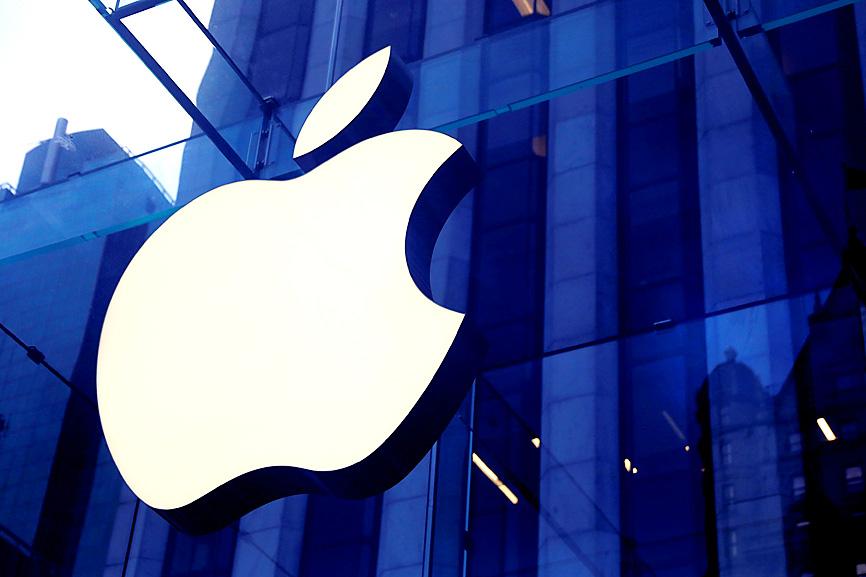Apple Inc on Tuesday lost its copyright claims against a Florida company that makes “virtual iPhones” used by security researchers to test for vulnerabilities to its system.
Apple claimed that Corellium LLC copied the operating system, graphical user interface and other aspects of the devices without permission.
It accused Corellium of acting under the guise of helping discover bugs in the iPhone’s operating system, but then selling the information “on the open market to the highest bidder.”

Photo: Reuters
Corellium’s actions fell under an exception to copyright law because it “creates a new, virtual platform for iOS and adds capabilities not available on Apple’s iOS devices,” District Court Judge Rodney Smith in West Palm Beach said in his ruling.
That Corellium sells its product “does not undermine its fair-use defense, particularly considering the public benefit of the product,” Smith said.
Apple has a “bounty program” where it rewards so-called white-hat hackers who discover flaws in its system.
The Cupertino, California-based company argued that the Corellium product went far beyond that, although Corellium said that it evaluates potential customers and rejects some.
Corellium said its customers are government agencies, financial institutions and security researchers, and accused Apple of trying to control security research to limit what the public learns about vulnerabilities.
Apple had been in talks to buy the company, but the two sides could not agree on a price, Smith said.
Apple sued a year later.
Corellium’s virtual product is used on a desktop computer and cannot make phone calls, send text messages, access iTunes or do any of the other things an iPhone can.
“There is evidence in the record to support Corellium’s position that its product is intended for security research and, as Apple concedes, can be used for security research,” the judge said. “Further, Apple itself would have used the product for internal testing had it successfully acquired the company.”
Officials with the two companies did not immediately respond to queries seeking comment.
Apple argued that the case is similar to the billion-dollar dispute between Oracle Corp and Alphabet Inc’s Google unit, in which an appeals court rejected Google’s arguments that it had the right to copy Oracle code for inclusion into the Android operating system.
The US Supreme Court is considering the issue.
Smith said that the two cases are not comparable — Corellium transforms iOS and adds new content, and it is not a direct competitor.
It was instead more like the case in which an appeals court ruled that Google’s creation of digital copies of books and showing snippets in search results was a fair use of copyrighted works, Smith said.
The judge said that Corellium might still be in breach of the US Digital Millennium Copyright Act, which prohibits tools to circumvent security measures, so he declined to dismiss that aspect of the case at this stage.
He ordered the two sides to submit a status report by Jan. 11 to determine how the case proceeds.

In Italy’s storied gold-making hubs, jewelers are reworking their designs to trim gold content as they race to blunt the effect of record prices and appeal to shoppers watching their budgets. Gold prices hit a record high on Thursday, surging near US$5,600 an ounce, more than double a year ago as geopolitical concerns and jitters over trade pushed investors toward the safe-haven asset. The rally is putting undue pressure on small artisans as they face mounting demands from customers, including international brands, to produce cheaper items, from signature pieces to wedding rings, according to interviews with four independent jewelers in Italy’s main

Japanese Prime Minister Sanae Takaichi has talked up the benefits of a weaker yen in a campaign speech, adopting a tone at odds with her finance ministry, which has refused to rule out any options to counter excessive foreign exchange volatility. Takaichi later softened her stance, saying she did not have a preference for the yen’s direction. “People say the weak yen is bad right now, but for export industries, it’s a major opportunity,” Takaichi said on Saturday at a rally for Liberal Democratic Party candidate Daishiro Yamagiwa in Kanagawa Prefecture ahead of a snap election on Sunday. “Whether it’s selling food or

CONCERNS: Tech companies investing in AI businesses that purchase their products have raised questions among investors that they are artificially propping up demand Nvidia Corp chief executive officer Jensen Huang (黃仁勳) on Saturday said that the company would be participating in OpenAI’s latest funding round, describing it as potentially “the largest investment we’ve ever made.” “We will invest a great deal of money,” Huang told reporters while visiting Taipei. “I believe in OpenAI. The work that they do is incredible. They’re one of the most consequential companies of our time.” Huang did not say exactly how much Nvidia might contribute, but described the investment as “huge.” “Let Sam announce how much he’s going to raise — it’s for him to decide,” Huang said, referring to OpenAI

The global server market is expected to grow 12.8 percent annually this year, with artificial intelligence (AI) servers projected to account for 16.5 percent, driven by continued investment in AI infrastructure by major cloud service providers (CSPs), market researcher TrendForce Corp (集邦科技) said yesterday. Global AI server shipments this year are expected to increase 28 percent year-on-year to more than 2.7 million units, driven by sustained demand from CSPs and government sovereign cloud projects, TrendForce analyst Frank Kung (龔明德) told the Taipei Times. Demand for GPU-based AI servers, including Nvidia Corp’s GB and Vera Rubin rack systems, is expected to remain high,